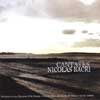Bacri Cantatas
A Frenchman who seems to find little hope in the world lets it shows in his music
View record and artist detailsRecord and Artist Details
Composer or Director: Nicolas Bacri
Genre:
Vocal
Label: L'Empreinte Digitale
Magazine Review Date: 5/2004
Media Format: CD or Download
Media Runtime: 105
Mastering:
Stereo
DDD
Catalogue Number: ED13170

Tracks:
| Composition | Artist Credit |
|---|---|
| Cantata No 4 |
Nicolas Bacri, Composer
Isabelle Sengès, Mezzo soprano Nicolas Bacri, Composer Orchestre Regional Bayonne-Côte-Basque Xavier Delette, Conductor |
| Notturno |
Nicolas Bacri, Composer
François Leleux, Oboe Nicolas Bacri, Composer Orchestre Regional Bayonne-Côte-Basque Xavier Delette, Conductor |
| Cantata No 5 |
Nicolas Bacri, Composer
CNR Bayonne Côte Basque Choir Nicolas Bacri, Composer Orchestre Regional Bayonne-Côte-Basque Sylvie Althaparro, Mezzo soprano Xavier Delette, Conductor |
| (5) Motets de souffrance et de consolation, Movement: Ego vir videns paupertam meam |
Nicolas Bacri, Composer
Enrique Azurza, Conductor Kea Choir Nicolas Bacri, Composer |
| (5) Motets de souffrance et de consolation, Movement: Quare tristis es |
Nicolas Bacri, Composer
Enrique Azurza, Conductor Kea Choir Nicolas Bacri, Composer |
| Motet no 7 |
Nicolas Bacri, Composer
Enrique Azurza, Conductor Kea Choir Nicolas Bacri, Composer |
| Benedicat Israël Domino |
Nicolas Bacri, Composer
CNR Bayonne Côte Basque Choir Enrique Azurza, Conductor Kea Choir Nicolas Bacri, Composer |
| Sinfonia da Requiem (Symphony No 3) |
Nicolas Bacri, Composer
François Leleux, Oboe Isabelle Sengès, Mezzo soprano Nicolas Bacri, Composer Orchestre Regional Bayonne-Côte-Basque Xavier Delette, Conductor |
Author: Marc Rochester
As Bach, Handel and Scarlatti are acknowledged as models for Nicolas Bacri’s cantatas, it is relevant to point out that in all their choral works there is nothing to equal the sustained outpouring of misery and gloom found here. Bacri (b1961) himself confesses that a part of him believes that ‘nothing’s going well and everything’s hopeless’: on the evidence of this two-disc set, I couldn’t agree more.
There is a solitary movement marked giocoso – in Cantata No 3 – and for the first 30 seconds or so of this 3'57" movement we do get a little bit of chirpy woodwind, but gloom and despondency quickly return and by 1'30" we are back to the slow, agonisingly tragic mood which permeates everything here. There are some passages which would be highly effective in a less oppressive context; the opening of Cantata No 1 with its profound duet between mezzo-soprano and oboe, the passionate outburst in the middle of the first part of Cantata 5 (tracks 4-6) with its incisive percussion and frantic orchestral fughetta and the highly atmospheric Quare tristis es for unaccompanied chorus.
Bacri’s obvious penchant for the sombre tones of the mezzo-soprano voice and oboe is persuasively supported by all three mezzos here as well as by oboist François Leleux, who reveals a wonderful depth of tone in the haunting Notturno for oboe and strings. It is only unfortunate that by the time the choir is called upon to produce anything slightly animated – the opening chorus of the unaccompanied Benedicat Israël Domino – they seem to have been so overwhelmed by the prevailing mood that their fire has been almost terminally extinguished.
There is a solitary movement marked giocoso – in Cantata No 3 – and for the first 30 seconds or so of this 3'57" movement we do get a little bit of chirpy woodwind, but gloom and despondency quickly return and by 1'30" we are back to the slow, agonisingly tragic mood which permeates everything here. There are some passages which would be highly effective in a less oppressive context; the opening of Cantata No 1 with its profound duet between mezzo-soprano and oboe, the passionate outburst in the middle of the first part of Cantata 5 (tracks 4-6) with its incisive percussion and frantic orchestral fughetta and the highly atmospheric Quare tristis es for unaccompanied chorus.
Bacri’s obvious penchant for the sombre tones of the mezzo-soprano voice and oboe is persuasively supported by all three mezzos here as well as by oboist François Leleux, who reveals a wonderful depth of tone in the haunting Notturno for oboe and strings. It is only unfortunate that by the time the choir is called upon to produce anything slightly animated – the opening chorus of the unaccompanied Benedicat Israël Domino – they seem to have been so overwhelmed by the prevailing mood that their fire has been almost terminally extinguished.
Discover the world's largest classical music catalogue with Presto Music.

Gramophone Digital Club
- Digital Edition
- Digital Archive
- Reviews Database
- Full website access
From £8.75 / month
Subscribe
Gramophone Full Club
- Print Edition
- Digital Edition
- Digital Archive
- Reviews Database
- Full website access
From £11.00 / month
Subscribe
If you are a library, university or other organisation that would be interested in an institutional subscription to Gramophone please click here for further information.




